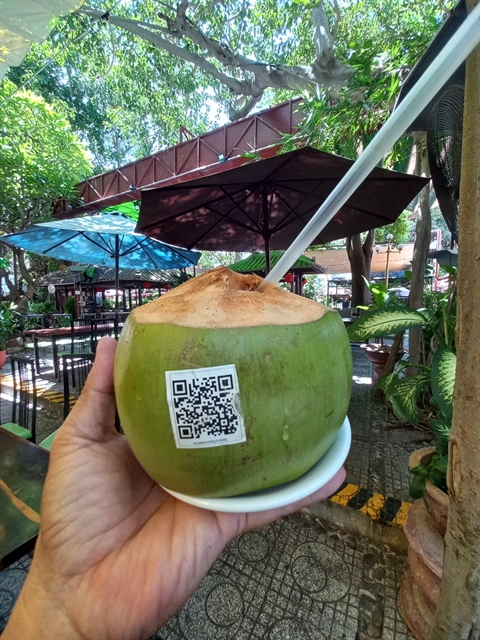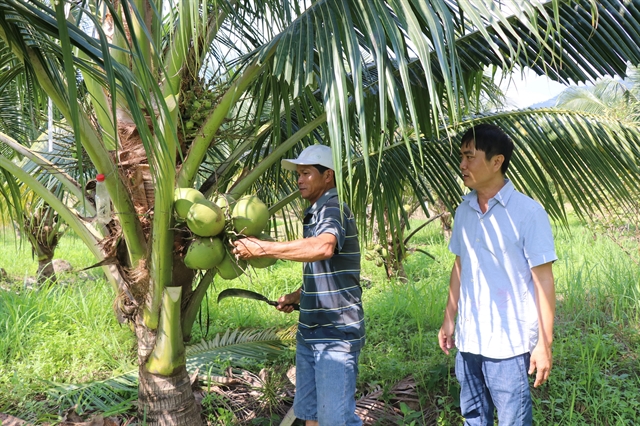 Economy
Economy

 |
| A QR code is attached to coconuts so that consumers can trace their origins. VNA Photo |
KHÁNH HOÀ - A local in Khánh Hoà province has been attaching QR codes to his organic coconuts so customers can trace the origins of the fruit, thereby enhancing his competitive advantage.
Nguyễn Phi Trường used to be a deputy director of a fairly famous travel company in Khánh Hoà, but his passion for organic agriculture, particularly coconut trees, led him to change his career path and become the owner of organic agriculture farm Phượng Hoàng Farm.
He has attached QR codes to coconuts so that consumers can trace their origins, and this has proven to be a very effective way to promote organic agricultural products.
His 20 hectares Phượng Hoàng Farm is nestled in a valley at the foot of Phượng Hoàng Mountain in Ninh Hoà Town, Khánh Hoà.
During the construction of his farm, he brought 1,000 coconut trees from Ninh Đa-Ninh Hoà commune, originally grown in coastal areas, up to the mountains.
To give the coconuts a sweet taste, he used a method of watering with stream water and feeding them salt.
His dedication was shown through his successful coconut garden, yielding sweet and delicious coconuts.
According to Trường, the essence of agriculture is to follow nature's lead, and organic agriculture has existed since ancient times, something our ancestors practiced.
However, as society becomes more modern, people have been using fertilisers and pesticides excessively, causing the soil to become depleted.
People only cared about increasing productivity, sometimes forgetting about the safety and hygiene of agricultural products.
Therefore, Trường’s farm had to take three years off from planting crops, allowing the grass to grow naturally, then cutting it down so that the soil would be completely free of any residual pesticides before proceeding to plant.
Trường emphasised that to implement an organic farm, one must adhere to the "three nos" principle, namely no pesticides, no herbicides, and no chemical fertilisers.
Currently, there are 500 coconut trees with fruits, providing 5,000 coconuts per month at a selling price of VNĐ20,000 per coconut, higher than traditional coconuts without a brand. The coconuts from the farm mainly serve resorts, restaurants, and cafes in the city of Nha Trang.
Lê Văn Phát, a staff of the farm, said that from preparing the land to planting and caring for the trees, no chemical fertilisers were used, only organic fertilisers.
This natural agriculture approach also includes planting various other flower species such as sim fruit and phoenix flowers to attract insects, limiting their concentration and attack on the coconut garden, thus creating a rich and balanced natural ecosystem, promoting sustainable development of the farm.
 |
| Nguyễn Phi Trường's coconut farm. His organic agriculture model has been very successful. - VNA Photo |
Phượng Hoàng Farm applies the practice of labelling each coconut with a sticker, an essential step to ensure transparency and affirm quality.
When buying coconuts, customers only need to scan the QR code to understand the origin and information of the farming culture and history of the farm while distinguishing Ninh Hoà organic coconuts from other types of coconuts.
Not just a coconut plantation, Phượng Hoàng Farm is also proud of its 3,000 rose myrtle fruit trees, which each season turn the entire garden purple, attracting not only local residents but also students from schools in the area.
The farm also grows over 2,000 other organic fruit trees such as apples, pears, plums, lychees, strawberries, jackfruit, and longan, creating a diverse environment for agricultural products.
Not stopping at just an organic farm, Trường also focuses on building an efficient distribution channel for organic agricultural products, thereby expanding opportunities to access a larger market.
Currently, Trường’s farm has registered to establish a Phượng Hoàng Organic Farming - Green Tourism Cooperative, with the participation of nearly 10 members in the local area. - VNS




